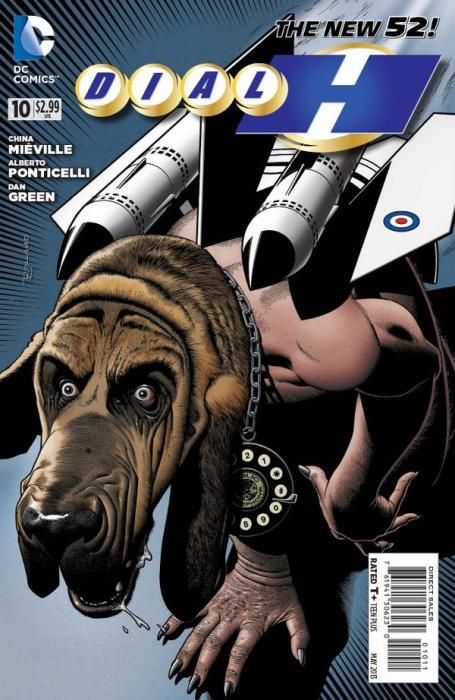"Dial H" #10, by China Mieville and Alberto Ponticelli continues the story of Nelson and Roxie pursuing a second dial, and while it's tempting to say "best issue yet" at the end of every issue, this one safely falls within that territory. Certainly the cliffhanger leaves me more eager for the next issue than any so far.
As usual, "Dial H" is fantastic. Mieville's imagination is peerless, pushing the boundaries of superheroic identities further than sometimes seems possible. Returning from last issue, Nelson's turn as The Glimpse is great fun -- the idea is mostly a joke, but it's taken so seriously that it almost becomes more cool than funny. It's a one-joke idea, but Mieville can rely on it to remain amusing for the short period of time it's needed.
A major part of the book's appeal is the way it has drip-fed the mystery of the dials to readers. This issue presents the biggest piece of the puzzle since "Dial H" #0, as Roxie and Nelson finally get their hands on another dial and find out that it doesn't quite work the same way as the one they've been sharing so far. It's gratifying as a reader to experience a book that's paced (and expertly so) as a monthly rather than a trade. Mieville's work is thick with information and nuance, and each issue demands to be examined and re-examined. It's anything but a quick, light read, which sets it apart from almost every other DCU title on the shelves.
Ponticelli's artwork is an interesting choice for the book. His style is far from glossy, but that actually works in favor of the story. His human characters are physically imperfect and grounded in realism, bringing a real sense for the superheroes' larger-than-life presence when they appear. Similarly, when he has to draw something creepy (like people in suits with ant heads) it comes over as genuinely disturbing rather than cartoonish. It's not necessarily superhero art you'd want on a lunchbox, but it is more original and interesting than you'd expect of a third-tier DCU series.
Speaking of the lack of gloss inherent in Ponticelli's leads, it's that which makes the final page all the more interesting. Nelson and Roxie are being quite literally seduced by the alter egos they taking on, and it's easy to see why. The book's big theme centers understandably around identity, so it's both shocking and understandable to watch them living out a situation that, in their "real lives," wouldn't occur. Of course, it's also unsettling, because readers know something they don't -- that the bodies they're wearing belong to other people. "Dial H" #10 has a genuinely compelling ending that should leave readers more than ready for more.

